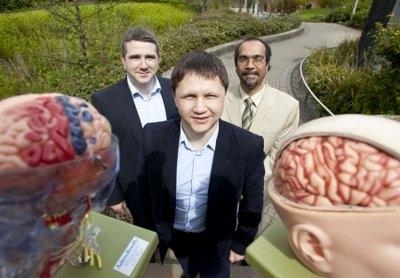The LANIR project is co-financed by the
European Commision with contract No.: 280804.
Copyright © 2012-2015. All rights reserved.


Dr Tofail Syed, Lead Scientist on a project to develop a screening device which will allow for the early detection of Alzheimer's disease has been named the Limerick Person of the Month.
Dr Tofail together with University of Limerick scientists have been awarded €5.4 million to develop a nanoscope which will allow the screening of patient cells for Alzheimer's disease. In Ireland, over 44,000 people are affected by Alzheimer's and other forms of dementia. There are 7.7 million new cases of dementia each year worldwide, implying that there is a new case of dementia somewhere in the world every four seconds. At present there is no test to screen for this disease. The World Alzheimer Report 2011 identified that the current lack of detection is a significant barrier to improving lives of people with Alzheimer's disease and other dementias, their families and carers.
The research team based at the Materials and Surface Science Institute (MSSI), UL are leading a European consortium that is developing the nanoscope. Dr Syed Tofail, Lead Scientist on the project said; "Early detection of Alzheimer's is critical in developing effective treatments for the disease and there is currently no test available. Our technique would be able to detect Alzheimer's-related amyloid plaques in the early stage with much more detail."
The prototype developed will be easy to use, flexible and allow direct imaging of the chemistry and the structure of very small features. The technique uses infra-red radiation as a source of detection but breaks away from its physical diffraction limit so as to see features as small as 70 nanometers in lateral dimension, which is comparable to the size of a virus. The technique is also capable of seeing buried features without the need for destroying the surface of a cell or a material. The global microscopy market in 2008 was estimated to be in excess of billion and this new technology will be applicable to all areas of this growing market.
UL is leading the 11 member European team, LANIR (Label Free Nanoscopy Using Infra-Red) which is undertaking this research. The team includes six SME's from across Europe including Limerick-based company, NT-MDT Ireland, who will provide key input into implementing a commercialisable table-top prototype.
Professor Noel O'Dowd, the MSSI Director, notes that the project builds on the MSSI's experience in high end microscopy and spectroscopy; "What is important about LANIR is that it is based on Infra-Red spectroscopy, which is a technique used as a routine testing method for many materials. LANIR technology improves the resolving power by almost 5 orders of magnitude. This is truly ground breaking technology which at the same time has a solid foundation which will allow it to be widely applied by scientists and engineers from a range of disciplines."
Denis Stoiakine, CEO, NT-MDT Ireland welcomed the collaboration; "This project is a good example of the strength of UL in translational research where research strongly impacts the industrial community. UL and NT-MDT's ability to work closely together, both in terms of R&D and geographic proximity, will be extremely helpful in implementing and commercialising the breakthrough technology from LANIR into a robust nanoscope product."

The LANIR project is co-financed by the
European Commision with contract No.: 280804.
Copyright © 2012-2015. All rights reserved.

